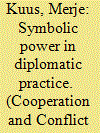| Srl | Item |
| 1 |
ID:
189367


|
|
|
|
|
| Summary/Abstract |
This paper examines and theorises sociability–‘the play-form of association’–in diplomatic settings. I highlight the workings of sociable interaction in diplomacy and I explain how we can better discern its broader role in bureaucratic processes. Empirically, I use virtual diplomacy during the COVID-19 pandemic to illustrate the difference that in-person sociability makes in diplomatic practice. The second half of the paper title references a comment by Michael Clauss, Germany’s ambassador to the European Union. Asked about virtual diplomacy, Clauss said that Zoom diplomacy is ‘20% as effective’ as the in-person kind. Conceptually, I use contemporary political geography and international relations as well as two thinkers of earlier decades–sociologists Georg Simmel and Erving Goffman–to theorise sociability. Methodologically, I advocate a more playful approach to sources in our study of professional practice. My objective is to prompt further study of sociability in bureaucratic settings.
|
|
|
|
|
|
|
|
|
|
|
|
|
|
|
|
| 2 |
ID:
121437


|
|
|
|
|
| Publication |
2013.
|
| Summary/Abstract |
This article makes a methodological argument about 'studying up' in foreign policy bureaucracies. Although recent years have witnessed a growing interest in ethnography across the social sciences, including the study of foreign policy and diplomacy, theoretical reflections on the methodology as such greatly outnumber those that actually attempt ethnographic accounts of foreign policy institutions. This imbalance results in large part from the difficulty of fieldwork in these settings. Drawing on six years of research on EU external relations, including 105 interviews with foreign policy professionals, this article lays out some of the difficulties and thereby clarifies the benefits and costs of such fieldwork. More broadly, the article highlights some of the methodological challenges in interpretative research inside the institutions of foreign policy. My concern is not with ethnography or foreign policy as such; I rather examine the specific challenges of conducting fieldwork informed by ethnographic methodology inside foreign policy bureaucracies. The article advises caution about the ever-widening use of the term 'ethnography' in the study of policy.
|
|
|
|
|
|
|
|
|
|
|
|
|
|
|
|
| 3 |
ID:
066272


|
|
|
|
|
| Publication |
2005.
|
| Description |
p567-591
|
|
|
|
|
|
|
|
|
|
|
|
|
|
|
|
| 4 |
ID:
082709


|
|
|
|
|
| Publication |
2008.
|
| Summary/Abstract |
This article uses the character of Josefvejk from the popular Czech novel The Good Soldier vejk and his Fortunes in the World War to illuminate the subversive effects of irony and self-deprecating humour on dominant geopolitical narratives. Empirically, my examples focus on the coverage of NATO invitation in major Estonian newspapers in 2002. Theoretically, these examples highlight the subtlety of resistance and the central role of irony in it. By foregroundingvejkian absurd obedience, which is nonetheless highly subversive, the article contributes to a better understanding of popular geopolitics, resistance geopolitics, and more broadly, the role of human agency in geopolitical discourses.
|
|
|
|
|
|
|
|
|
|
|
|
|
|
|
|
| 5 |
ID:
141725


|
|
|
|
|
| Summary/Abstract |
This paper investigates the workings of symbolic power in diplomatic practice. At the level of empirical observation, it focuses on the intangible and incalculable ‘feel for the game’ that distinguishes a well-informed and relaxed insider from an ill-informed and ill-at-ease outsider in European Union (EU) diplomatic circles in Brussels. By highlighting the play of social resources, such as reputation, presence, poise, and composure in these circles, I examine EU diplomacy from an angle – symbolic power – that is often overlooked in the existing work on that field. Conceptually, the analysis focuses on the role of informal social resources rather than formal institutional structures in diplomatic practice. It also outlines the potential synergies between the study of diplomacy in international relations (IR) on the one hand and geography, anthropology, and sociology on the other. The paper thereby advances the analytical toolbox of diplomatic studies and practice theory. Such conceptual sharpening is needed, especially now that diplomacy is becoming more transnational and less linked to the foreign ministries of states.
|
|
|
|
|
|
|
|
|
|
|
|
|
|
|
|